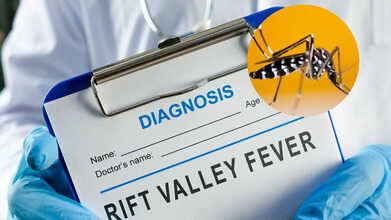- Health Conditions A-Z
- Health & Wellness
- Nutrition
- Fitness
- Health News
- Ayurveda
- Videos
- Medicine A-Z
- Parenting
- Web Stories
Donald Trump Gets COVID And Flu Shots During His Second Health Check Of The Year

Credits: Canva
The White House on Friday shared a memo from President Donald Trump’s physician detailing his latest visit to Walter Reed Army Medical Center, where he received both a COVID-19 booster and a flu shot.
In the one-page summary, Dr. Sean P. Barbarella noted that the former president “continues to be in excellent health, showing strong cardiovascular, respiratory, neurological, and overall physical function.”
According to the memo, Trump’s stop at Walter Reed was a “scheduled follow-up.” White House press secretary Karoline Leavitt had earlier in the week described it as part of his “routine annual check-up,” even though it marks his second visit this year following a full physical examination.
Why Donald Trump Took the COVID Shot?
The memo explained that the former president’s visit involved preventive health screenings and immunizations, which included his annual flu vaccine and an updated COVID-19 booster. It also mentioned that Trump has suggested plans to travel to Egypt in connection with the Israel-Gaza peace efforts.
In addition, the document noted that “comprehensive laboratory tests conducted during the visit showed outstanding results, with stable metabolic, blood, and heart indicators.” The report concluded that Trump continues to maintain excellent overall health.
Access to COVID Shots Narrows Under Trump Administration
COVID-19 vaccines have become more difficult to access during the Trump administration. On Monday, the Centers for Disease Control and Prevention revised its vaccination guidelines, now recommending the shots only for individuals aged 65 and above or for those with existing health conditions, and only after consulting a healthcare provider such as a doctor, nurse, or pharmacist.
This update follows months of differing state-level vaccine rules, which created a confusing patchwork of policies nationwide. As a result, many people are finding it increasingly challenging to get vaccinated, depending on where they live.
CDC Says People Must Consult a Health Professional Before COVID Shot
Acting CDC Director Jim O’Neill has approved new COVID-19 vaccine recommendations proposed by Health Secretary Robert F. Kennedy Jr.’s selected Advisory Committee on Immunization Practices, which convened in September.
During a previous meeting held in June, vaccine advisers to the CDC had discussed revising the vaccination process. Under the new rules, people are now required to speak with a doctor, pharmacist, or another healthcare provider about the potential risks and benefits before receiving the shot. This added step, referred to as “shared decision-making” or “individual-based decision-making,” is highlighted in the CDC’s official statement.
The updated policy represents the final step needed to enforce the new vaccination guidelines, influencing who can receive and administer the COVID-19 vaccine and determining whether it will be covered by private or public insurance plans without additional copayments.
Final Recommendations Were Delayed
The approval followed an unusual two-week delay between the time CDC advisers issued their recommendations and when the agency formally accepted them. With this decision now in place, the CDC can begin distributing vaccines to doctors, clinics, and other healthcare providers under the Vaccines for Children Program, which supplies free vaccines to about 40 percent of children in the United States.
What Is Rift Valley Fever? Outbreak In Senegal Kills 18 And Prompts Health Warnings

Credits: Canva
Senegal has reported 17 deaths from Rift Valley Fever (RVF), according to a health ministry official on Thursday, marking a rare and serious outbreak of the viral disease in the West African nation. So far, 119 cases have been confirmed, primarily in northern Senegal’s livestock-producing areas. The outbreak is raising concerns about further spread, said Dr. Boly Diop, head of RVF surveillance at the health ministry. But what exactly is Rift Valley Fever, why is it spreading in Senegal, and can it infect humans?
What Is Rift Valley Fever?
Rift Valley Fever is a viral illness that mainly affects animals but can also infect humans. The disease can cause severe illness in both animals and people. According to the World Health Organization, the RVF virus is part of the Phlebovirus genus. It was first identified in 1931 during an investigation of a sheep epidemic in Kenya’s Rift Valley.
Outbreaks have since been reported throughout sub-Saharan Africa. In 1977, a major outbreak struck Egypt after infected livestock were introduced through trade along the Nile irrigation system. Between 1997 and 1998, another significant outbreak affected Kenya, Somalia, and Tanzania, following heavy rains and flooding linked to the El Niño phenomenon. In September 2000, infected livestock from the Horn of Africa carried the virus to Saudi Arabia and Yemen, marking the first known instance of Rift Valley Fever outside Africa and raising concerns about its potential spread to parts of Asia and Europe.
Signs and Symptoms of Rift Valley Fever
Many infections are asymptomatic, but uncomplicated human cases of RVF typically present like a short-term flu like illness. Symptoms include fever, chills, headache, severe muscle and joint pain, light sensitivity, and loss of appetite. Occasionally, patients may experience a petechial rash, nausea, vomiting, or nosebleeds, according to the European Centre for Disease Prevention and Control.
How Is Rift Valley Fever Transmitted?
As the WHO explains, Rift Valley Fever is primarily an animal disease but can also infect humans. It is spread by mosquitoes and blood-feeding flies. Most human infections occur through direct or indirect contact with the blood or organs of infected animals. This can happen while handling animal tissue during slaughter, assisting with births, performing veterinary procedures, or disposing of carcasses or fetuses. Certain occupations, such as herders, farmers, slaughterhouse workers, and veterinarians, are therefore at higher risk. There is also evidence that humans can contract RVF from consuming unpasteurized or undercooked milk from infected animals.
Infections may also result from bites by infected mosquitoes, particularly Aedes and Culex species, and transmission through blood-feeding flies is possible as well.
Do We Have a Vaccine for Rift Valley Fever?
Since most human cases are mild and short-lived, specific treatment is generally unnecessary. Severe cases are managed with early supportive care, including fluid management and treatment of individual symptoms, according to WHO guidance.
An inactivated vaccine has been developed for humans but is not licensed or commercially available. It has been used experimentally to protect veterinary and laboratory staff at high risk of exposure. Additional candidate vaccines are currently under investigation.
Taking Amlodipine? NHS Issues Safety Warnings For Blood Pressure Patients, Here’s Why

Credits: Canva
The NHS has issued a caution on its website for anyone taking a commonly prescribed medication for high blood pressure. Also known as hypertension, this condition affects roughly one in three adults in the UK, many of whom may not even be aware they have it. Since uncontrolled high blood pressure can raise the risk of stroke, heart disease, and kidney problems, early treatment is essential.
This is where blood pressure–lowering medications come in. As of 2025, amlodipine (a calcium channel blocker) and ramipril (an ACE inhibitor) rank among the most commonly prescribed drugs in the UK. Recently, the NHS has highlighted some warnings regarding these medications. Let’s look at why and what precautions patients taking them should follow.
What Is Amlodipine?
Amlodipine is a calcium channel blocker that helps manage high blood pressure. A single dose works for over 24 hours, so it only needs to be taken once daily. It is also prescribed for people experiencing chest pain. According to the Cleveland Clinic, amlodipine relaxes blood vessels and eases the workload on the heart. Each year, more than 30 million prescriptions are written for this medication. Many patients take amlodipine for long periods or even for life. It is usually recommended when lifestyle changes alone are insufficient to control blood pressure or when genetic factors make medication necessary.
How Amlodipine Works?
Amlodipine helps prevent future heart problems, including heart disease, heart attacks, and strokes. It is also used to relieve chest pain caused by angina. The drug lowers high blood pressure by relaxing and widening blood vessels, which makes it easier for the heart to pump blood throughout the body. In angina, chest pain occurs because arteries leading to the heart are narrowed and stiff. Amlodipine improves blood and oxygen flow to the heart, easing these symptoms. It is available only with a prescription and comes as a tablet or a liquid that is swallowed.
Why Is the NHS Warning Against Amlodipine?
Patients taking amlodipine should avoid one particular drink. The NHS website states: "Do not take amlodipine with grapefruit juice. Consuming large amounts of grapefruit or grapefruit juice can raise amlodipine levels in your body and worsen side effects. If affected, you may need to avoid grapefruit or grapefruit juice while on this medication."
It adds: "Tell your doctor if you experience increased side effects, such as dizziness, flushing, or headaches, after consuming grapefruit or grapefruit juice. Otherwise, you can continue to eat and drink normally while taking amlodipine."
Amlodipine Side Effects
These side effects occur in more than one in 100 people. They are usually mild and temporary, and there are ways to manage them:
- Headaches: Rest and stay hydrated. Limit alcohol intake. Your pharmacist can suggest a suitable painkiller. Headaches usually ease within the first week of starting amlodipine. Contact your doctor if they persist or are severe.
- Feeling dizzy: Sit or lie down until the dizziness passes. Avoid driving, cycling, or operating machinery until you feel better.
- Flushing: Reduce coffee, tea, and alcohol consumption. Keep your environment cool, use a fan, spray your face with cool water, or sip cold drinks. This usually resolves in a few days; consult your doctor if it persists.
- Pounding heartbeat: Take amlodipine when you can rest or sit down if symptoms occur. Reducing alcohol, smoking, caffeine, and heavy meals may help.
FDA Issues Urgent Recall on Frozen Vegetable for Listeria—Here Are the Products You Should Avoid

Credits: canva
Hellofresh: As the listeria outbreak continues to spread across the United States, more products are being identified as contaminated. The U.S. Food and Drug Administration (FDA) has issued a recall for certain frozen spinach items found to contain Listeria monocytogenes. The affected spinach was sold under two names, Del Mar 35-pound Bulk Organic Frozen Spinach and Sno-Pac Organic Frozen Cut Spinach in 10-ounce packs, distributed to consumers across the country.
Each year, millions of Americans deal with food sensitivities and allergies. According to the FDA, the nine main food allergens in the United States include eggs, milk, fish, wheat, soybeans, crustacean shellfish, sesame, tree nuts, and peanuts.
HelloFresh Meals Contaminated With Listeria
Federal health officials have advised the public not to eat certain HelloFresh subscription meals containing spinach that may be contaminated with listeria. In connection with the same concern, Sno Pac Foods, Inc. has also recalled both its Sno Pac and Del Mar brands of organic frozen spinach products due to fears of Listeria monocytogenes contamination.
The recalled Del Mar Bulk Organic Frozen Spinach was sold in 35-pound boxes with an expiration date of January 1, 2027, and the following lot numbers: 250107A, 250107B, 250107C, 250107D, 2501071, and 2501073.
The Sno Pac Organic Frozen Cut Spinach came in 10-ounce containers with these lot codes and “best by” dates: SPM1.190.5 (best by July 9, 2027), SPC1.160.5 (best by June 9, 2027), SPC2.160.5 (best by June 9, 2027), and SPM1.097.5 (best by April 7, 2027).
The official notice warns: “Healthy individuals may experience short-term symptoms such as high fever, severe headache, stiffness, nausea, abdominal pain, and diarrhea. However, Listeria infection can lead to miscarriages and stillbirths in pregnant women.”
For more details, consumers can view the recalled product labels on the FDA website. Anyone who has these frozen spinach products at home is urged not to eat them. Instead, they should dispose of the items safely or return them to the store for a full refund.
Previous Listeria Outbreaks
Just last month, FreshRealm confirmed that tests showed pasta used in certain linguine dishes sold at Walmart carried the same strain of listeria linked to an earlier outbreak in June. That outbreak, which initially involved chicken fettuccine Alfredo, resulted in at least four deaths and 20 reported illnesses, the most recent occurring on September 11.
What Is Listeria Monocytogenes?
According to the National Institutes of Health, Listeria monocytogenes is a type of bacteria that causes the infection known as listeriosis. It is a facultative anaerobic organism, meaning it can survive with or without oxygen. The bacterium can live and multiply inside the body’s cells, making it one of the most dangerous foodborne pathogens known.
Listeria Symptoms
A listeria infection can be especially serious for older adults, pregnant women and their newborns, and individuals with weakened immune systems. Common symptoms include fever, muscle aches, headache, stiff neck, confusion, loss of balance, and convulsions.
The Centers for Disease Control and Prevention (CDC) estimates that around 1,600 people become ill from listeria infections each year, and roughly 260 die. Federal agencies said in December that they were revising safety procedures to prevent further outbreaks following several major incidents, including one linked to Boar’s Head deli meats that caused 10 deaths and more than 60 illnesses last year.
© 2024 Bennett, Coleman & Company Limited

